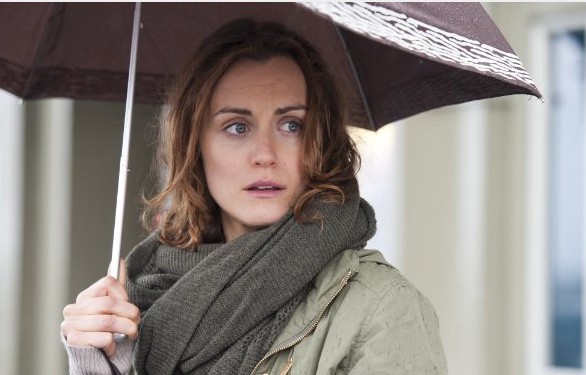Actress Taylor Schilling (Orange is the New Black) and writer-director Wiebke von Carolsfeld (Marion Bridge) share a mutual passion: telling women’s stories.
“I was really compelled by Wiebke’s journey,” says Schilling of their new collaboration, the Idomestic drama Stay. “She’d been nurturing this project for 10 years and I thought, ‘Here’s someone who’s really excited about telling this story, There’ll be some good juju attached to that.”
Stay, which is loosely based on the novel by Aislinn Hunter, had themes that intrigued von Carolsfeld, mainly because she felt they hadn’t been adequately or accurately tackled on film before. The frank discussion of whether or not Schilling’s character Abby — a young Canadian women living with her much older lover in rural Ireland — feels ready to be a mother after finding out she’s accidentally pregnant is central to what makes the quiet film feel practically bold in its premise.
“There are very few women filmmakers, so topics that are pertinent to females tend to not make it onto the screen,” explains von Carolsfeld. “And if they do, they’re considered not as exciting. The conflicted feeling of motherhood is not something that’s comfortable to think about, because what if our own mother felt that way?”
Schilling agrees and admits to feeling starved for films that fully explore what are often seen as “alternative” lifestyle choices for women. “I think that women’s roles are still pretty well-defined. The ideas of what a woman is and what a woman should be and what that life path looks like are still pretty rigid. Even though we’ve come a long way, there’s still quite a long way to go. So there are little elements that we don’t talk about as much. I certainly relate to that. Do you even want to have children? That’s a choice and it’s a totally valid choice to not do it. But that doesn’t get a lot of airplay.”
The actress continues, “I think not wanting to be a mother or not being good at it is an experience that’s right on the money for a lot of people. When it’s talked about it, it gives everyone more breathing room to actually do what feels right to them.”
But that type of honest conversation about women’s lives isn’t always an easy sell, claims von Carolsfeld. In fact, it’s proven to be an obstacle to getting her projects financed over the years. “Even if women get to make films, we get to make them on a lower budget. I think part of why it took me so long to make Stay is because I’m a female director and because it’s a female-driven story for women. I’m very clear on that. I want to make movies essentially for myself, and that’s partly because I feel there are not enough movies out there for me.”
Although a relative newcomer to the entertainment industry, Schilling says she’s already noticed the gender imbalance behind the camera and finds it baffling. “I’ve definitely noted that there aren’t many female directors. I just don’t see projects with women at the helm all that much. That was something that attracted me to Stay. That’s something I love about Orange is the New Black as well — it’s created by so many powerful women. Who can look at either of these projects and not think that women have something valid to say about their lives?”
“It’s a little strange because in literature it’s not like that,” adds von Carolsfeld. “There are lots of books written by women and for women. There’s a lot more choice. In cinema we just don’t have the choice, and it has to do with the idea that women’s stories don’t make money.”
The director does feel that a change may be on the horizon though, even if it’s slow going. “I do know that there are people in positions of power who are starting to think about what can be done. But something really has to shift because it’s not like women aren’t in film school and it’s not like we’re not trying. It’s just that we don’t get the same opportunities. It’s as simple as that.”
However, despite the current bleak outlook, both von Carolsfeld and Schilling are hopeful that the very act of talking about the problem will inspire the industry to reassess its views on films made by and for women.
The director maintains that it remains a bit of an uphill battle though. “It’s funny because people don’t really want to talk about it. I’ve had other women get angry with me for bringing it up, sort of like, don’t go there. But I’m already there.”
It may be one hell of a fight, says Schilling, but she’s confident that things are changing for the better. “There are so many talented women out there. It’s just a matter of finding them and getting the industry to acknowledge how amazing they are. I have to believe that will happen.”
Stay opens on March 21.







